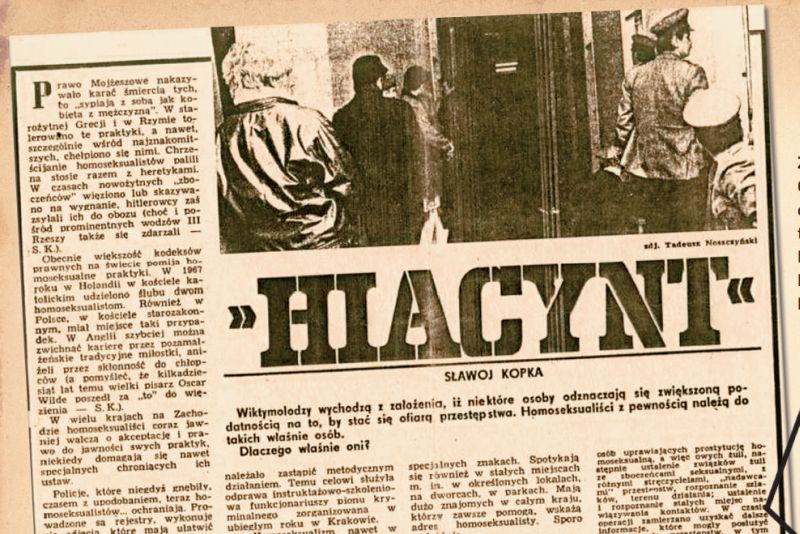The 1969 Stonewall riots are commonly considered the beginning of the US gay liberation movement. After the riots, activists began more actively to organize themselves professionally by efficiently gathering funds and officially registering their associations. Because this US example has become an international icon for the LGBT rights movement, activists in other parts of the world have since taken inspiration from Stonewall history. One prominent example from Poland is the Stonewall Fund established by Lambda Warszawa on the 40th anniversary of the riots.

Academics, too, draw on the history of the gay liberation movement in the US to report the beginnings of particular national LGBT struggles. And although, as Robert Kulpa and Joanna Mizielińska (2011) rightfully point out, ‘Stonewall never happened’ in Central and Eastern Europe, some academics nonetheless employ the Stonewall imagery to explain the foundation of the Polish LGBT movement. For example, Paweł Leszkowicz and Tomek Kitliński (2005) suggest that a campaign ‘Let Them See Us’, launched in 2003 by the biggest LGBT organization in Poland, Campaign Against Homophobia, could be considered the Polish Stonewall.
During the ‘Let Them See Us’ campaign, photographs of same-sex couples holding hands in public places were exhibited in galleries but also, more controversially, on billboards in selected Polish cities. Leszkowicz and Kitliński conclude that it was ‘the first public coming out on that scale in the history of this country. Nearly the Polish Stonewall?’
Reflecting on the history of the Polish LGBT movement in a piece written for the book Queer in Europe, I locate the Polish ‘Stonewall’ much earlier, in 1985. In November that year, the police of the People’s Republic of Poland (1952-1989) raided parks, public toilets and bars in the biggest Polish cities in order to detain homosexual men and collect their personal data. It was an organized operation code-named ‘Hyacinth’, which continued until 1987. Unlike the raid on the Stonewall Inn, the ‘Hyacinth’ operation did not trigger any riots or mass protests. Yet, it did result in a greater mobilization of LGBT activists in Poland, including unofficial organizing and the publication of queer zines. For this, I named it the Polish Stonewall.
Yet, it is not my intention here to wonder again which point in Polish LGBT history serves best as a local equivalent to the Stonewall riots. Instead, I want to reflect on the very idea of searching for the Polish Stonewall. Thomas Piontek (2006) argues that because Stonewall so often functions as the only legitimate foundation of the US LGBT movement, it privileges white gay men and ignores the struggle of activists before Stonewall. He asks us to recognize that the history of Stonewall, like all history, is made rather than discovered.
If Stonewall is a history that is made, what does it mean to search for the Polish equivalent? In the end, it becomes a search for a copy with no original, a simulacrum. Of course, Stonewall imagery may still play a great role both in the US and beyond, for example in the creation of a shared LGBT consciousness. However, we need to admit that we make rather than simply write LGBT histories and reflect more on using a specific mythologized past taken from the US to explain LGBT struggles in other parts of the world.
Further reading:
Kulpa, R. and Mizielińska, J. (2011) Introduction: Why Study Sexualities in Central and Eastern Europe? In R. Kulpa and J. Mizielińska (eds) De-Centring Western Sexualities: Central and Eastern European Perspectives, pp. 1-9. Ashgate: Farnham.
Leszkowicz, P. and Kitliński, T. (2006) Miłość i Demokracja: Rozważania o Kwestii Homoseksualnej w Polsce [Love and Democracy: Thoughts on Homosexuality in Poland]. Aureus: Kraków.
Piontek, T. (2006) Queering Gay and Lesbian Studies. University of Illinois: Urbana.
Szulc, L. (2011) Queer in Poland: Under Construction. In L. Downing and R. Gillett (eds) Queer in Europe: Contemporary Case Studies, pp. 159-172. Ashgate: Farnham.
 Łukasz Szulc is a PhD Candidate in the Department of Communication Studies at the University of Antwerp. His research project investigates (trans)national queers online and is based on case studies from Poland and Turkey. Łukasz blogs in Polish at www.dopiskipedala.blox.pl and his personal website is www.lukaszszulc.com He tweets from @lukaszszulc
Łukasz Szulc is a PhD Candidate in the Department of Communication Studies at the University of Antwerp. His research project investigates (trans)national queers online and is based on case studies from Poland and Turkey. Łukasz blogs in Polish at www.dopiskipedala.blox.pl and his personal website is www.lukaszszulc.com He tweets from @lukaszszulc

NOTCHES: (re)marks on the history of sexuality is licensed under a Creative Commons Attribution-NonCommercial-NoDerivatives 4.0 International License.
Based on a work at www.notchesblog.com.
For permission to publish any NOTCHES post in whole or in part please contact the editors at NotchesBlog@gmail.com




